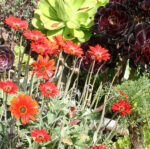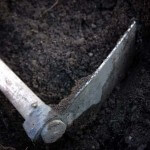
I’ve been wanting to try out copper tape for slugs and snail as a method to stop or at least prevent damage to my plants for a while. Copper is said to repel slugs and snails by giving them a small static shock as they attempt to pass over the material.
Last year must have been the worst year ever for gardeners. The continually wet summer and autumn saw slug and snail populations skyrocket. My allotment plot was stripped, and I brought in absolutely nothing during harvest. I think that it is now time to test the copper tape slugs and snail barrier and find out how much protection it truly offers.
Buying copper tape – Stop slugs & snails!
Initially, I was put off by the cost—typically £5 for about 4 metres of copper tape for slugs on a 4 cm roll. However, after searching online (eBay), I found a few suppliers offering the same product for a fraction of the price. I paid around £8 for 16 metres. It’s always worth shopping around when buying copper tape for slugs.
During March, I began applying the copper tape for slugs around the base of my greenhouse staging. I had about 20 trays of seedlings to protect. Later, I used the same copper tape for slugs around flower tubs and troughs where I planted flowers and vegetables that I knew slugs and snails would love to strip bare.
I made sure that whatever surface I adhered the copper tape for slugs to was clean and dry. The tape is very similar to sellotape in its adhesive qualities but much stronger. It’s thick, like high-quality oven foil. If you need extra adhesion, you could try glueing it on. However, the copper tape for slugs seems to stay put without further glueing.
Slugs & Snails – nil pois?
Now, at the end of July, I am reasonably happy to report a modest success rate with the copper tape for slugs. This year, I’m growing Hostas, Pak Choi, French marigolds, and Larkspur—plants that have been slug magnets in my garden in the past. So far, they are all looking very healthy, with no visible damage. I did spot a single snail in one of my planters, but there was no evidence of harm. Perhaps crossing the copper tape for slugs deterred it from continuing its feast.
I also applied the copper tape for slugs around the bases of my young runner beans and French climbing beans. I used 10 cm lengths of PVC drainpipes with rings of tape applied around the top. Again, as with the other protected plants, there have been no casualties this year.

Copper tape For Slugs: My verdict
From my experiences this year, I have found that copper tape for slugs is only partially effective in creating a barrier and protecting my plants. Other factors, such as drier weather and additional slug control methods, also play a role. So, does copper tape for slugs work? I believe it helps, but only to a certain extent. It should be used alongside other slug and snail control techniques for the best results. Copper tape for slugs is just another tool to add to your arsenal in the ongoing battle against these garden pests.
It’s all about balance
I would suggest using a mixture of methods to best control slugs and snails in your garden:
- Copper tape for slugs: This will stop some slugs and snails in their tracks, but not all.
- Hand-picking and disposal: Not the nicest of jobs, but if done every night, will yield good results. Use gloves when picking up slugs. It can be difficult to wash the slime off your hands. I use a head torch and check my garden every night during spring and summer. Your workload will increase during wet weather!
- Reptiles: Attract slowworms into your garden. They love eating slugs and snails. Give them an incentive to call your garden “home”. A piece of corrugated iron is a perfect dwelling for most slow worms.
- Chemical intervention: Use ORGANICALLY APPROVED slug pellets. They work exceptionally well. An excellent method if you are overwhelmed by slugs and snails. Organic, Ferric phosphate-based pellets will shut down their digestive system. Slugs and snails will bury themselves in the soil and die after digesting these pellets, leaving no mess.
- Beer traps: Bury a jam jar up to its rim near your crops and fill it with beer. Slugs and snails aren’t picky. Cheap beer will do.
- Avoid Metaldehyde-based slug pellets: Unless the pellets have the organic seal of approval, they are likely to contain very harmful chemicals that will harm other animals and perhaps even children. They are not as effective as organic slug pellets. Avoid it at all costs!
- Do not count on hedgehogs! Yes, you heard me correctly. Slugs and snails often carry a parasite called a lungworm. Lungworms are very harmful to hedgehogs and possibly account for half of their population decline in the UK. You are better off trying to encourage slow worms, frogs, and toads into your garden to keep down the slug and snail populations.
Using the methods above, you’ll be amazed at how slug and snail-free your garden can become. I’m certainly impressed—it’s wonderful to grow varieties of plants that I once considered “slug food.”
Watch the following video to see how slugs and snails react to a copper tape for slugs barrier placed around a pot:
Still skeptical? Want to take the concept of a copper tape for slugs barrier to the next level? Try electrifying your copper (or any conductive metal) with a 9-volt battery. That should do the trick!
Frequently Asked Questions About Copper Tape for Slugs & Snail Control
Is copper tape for slugs effective?
According to a Royal Horticultural Society study, the answer is “No.”. However, I disagree. I believe it works to a certain extent, but it should be used in conjunction with other methods of control.
Why do slugs dislike copper tape for slugs?
Slugs and snails are said to dislike copper because it causes a harmless electric shock-like reaction when they come into contact with it. Whether that is true or not is yet to be proven.
What is the most effective slug deterrent?
You. Get a head torch and track them down every night. Although unpleasant, this is still a highly effective approach.
What factors contribute to slug infestation?
Slugs prefer to hide under moist plant debris because the mulch on them keeps them warm at night. Slugs make their way under rocks, weeds, and fallen logs. Moisture is the main factor that attracts slugs to lawns.
Further reading on slug & snail control
- Natural organic slug and pest control
- Here is another article and opinion on this topic


